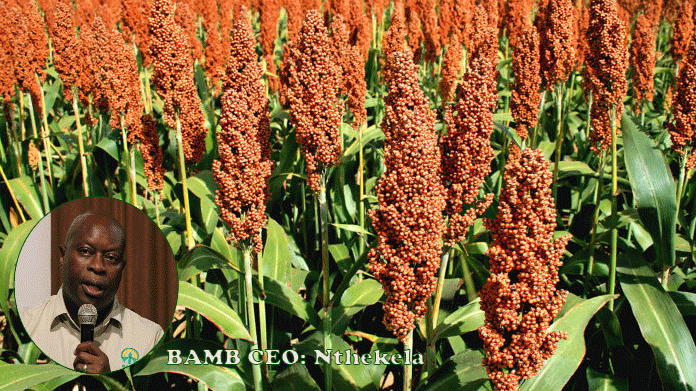Since January, Botswana has been hit by a shortage of sorghum grains.
Desperate attempts to arrest the situation have led to the country looking to South Africa, Zambia, Brazil and Australia for imports.
However, with no help forthcoming yet, the risk to the nation’s food security grows stronger.
Speaking to Voice Money, Sorghum Millers Association Chairperson, Motlhagodi Molomo described the situation as worrisome, especially as sorghum is a staple food locally.
“Sorghum grains were available last year to last us to the next harvest period. As millers we don’t have the buying power which means we cannot afford to buy directly from farmers in Mosisedi or Pandamatenga because of lack of funds. Further we don’t have storage which means we only buy in sizeable quantities. We got into this business hoping that retailers will support us but others are competing with us; but we are grateful to those who have been buying our products,” said Molomo, adding the current shortage has nothing to do with the Russia/Ukraine war.
The situation on the ground is dire, with many millers closing shop and laying off employees.
“We employed people but they are currently home and some we don’t know where they are. When this situation commenced in January, we mobilized a meeting with the government because there are Strategic Grain Reserves (SGR) which have sorghum. Of course we did meet but two-to-three months later we still don’t have any answers from the government side and I don’t know what to say to the millers,” continued an exasperated Molomo.
The shortage has led to low supply to millers, which in turn has caused increased prices for sorghum meal, creating a negative impact on the entire value chain and ultimately the pockets of the people.
When Voice Money visited various retailers around Gaborone this week, a 10kg bag of sorghum meal was selling at an average of P92.95 (P78.95 – P112.95), compared to a maximum price of P60 late last year.
“Batswana shouldn’t be buying their staple food at this price. Due to the buying power, we can’t even import on our own. Even from South Africa and Australia the prices are almost double. On the other hand, Botswana Agricultural Marketing Board (BAMB) want us to buy from them but already they are competing with us selling bopi; how can they supply us but still compete for tenders with us? We are struggling very much but we are holding onto our brands hoping for the best,” lamented Molomo, who heads over 20 small to medium sorghum millers in Botswana.
Botswana’s annual sorghum consumption is estimated at 100, 000 metric tonnes (MT).
Current reserves are said to stand at 9, 2000 MT, which worryingly is slightly below the minimum target level of 10, 000 MT.
Addressing the media last week, BAMB Acting-CEO, Lameck Nthekela said while erratic rainfalls are involved, production, distribution and market distortions were key to the national shortage.
“Amongst the major challenges we face is that big suppliers and millers buy directly from farmers and this eventually disrupts and distorts the price set by us. Some millers who are also our customers go to farm gates to purchase there. Further, farmers who have signed contracts with us do not supply agreed quantities as per contracts,” he said.
While much blame is pinned on drought and climate change, statistics indicate BAMB’s collection from farmers has been on a downward spiral over the years.
In 2019, BAMB expected 53, 945 MT from farmers but only received 28, 659.The trend continued in 2020,with BAMB receiving 37, 832 instead of 53, 283.
The variance skyrocketed to 30, 769 in 2021, when BAMB received 22, 562.06 of harvest from a possible 53, 331.
Last year, the figures declined again, with the Marketing Board getting 11, 387 MT from the 20, 420 that was expected.
For 2023, Nthekela said they are expecting almost 65, 000 MT from the 40, 000 – 44, 000 hectares ploughed.
“It’s not like efforts we are trying as remedies are proving futile for some specific reasons, it’s because there is no sorghum completely in the market. Within the region there is nothing – that is why we are trying as far as Brazil and Australia! There, the quantities are minimum but the prices are quite exorbitant, and this is the same situation in Zambia where they have some sizeable quantities, but the challenge being price. So that’s the situation but we are hopeful because we are almost close to harvest time and people who were holding on their produce because of speculative purposes are coming out willing to sell,” said Nthekela, explaining they expect the situation to persist for a further two months.
The last time Botswana experienced similar shortages of sorghum was in 2012, when BAMB had to purchase 15, 000MT from Australia to augment local production.
As part of their initiatives to entice farmers, BAMB has increased contract farming price per metric tonne for sorghum from P2, 550 to P3, 750.
Meanwhile, Voice Money reached out to Minister of Agriculture, Fidelis Molao who referred us to Minister of Entrepreneurship Karabo Gare since BAMB falls under his mandate.
However, Gare told this publication he could not comment on the matter as he doesn’t have figures from BAMB and is still engaged at the Forbes 30 Under 30 Summit.





